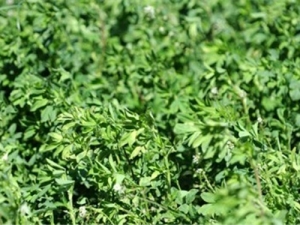Farmers getting very lush lucerne are wondering whether a grain or carbohydrate supplement will help on their lucerne.
So says Beef + Lamb NZ senior extension manager Aaron Meikle.
He says BLNZ recommend a fibre source particularly when animals are on green lucerne, to help with bloat.
San Jolly, an Australian expert in dryland nutrition, says there is no doubt that regardless of what animals are grazing on lucerne, if you supplement with a cereal grain you will get a growth rate response.
But she adds that farmers need to monitor growth rates to see whether it is a cost effective growth response.
Lucerne is a more fibrous plant than brassicas so it is best not to use a supplement containing straw. If you choose hay or silage make sure it is good quality.
Established lucerne is about 40% protein and scours are more likely to do with ammonia toxicity than anything to do with fibre.
"Cereal grain supplementation in that case will help mop up a lot of that protein and provide the animal with additional energy in metabolising that protein."
Jolly recommends good quality oats. She doesn't know about New Zealand oats, but of all the grains it is fickle and there are good quality oats and low quality. Feed testing is critical to identify high ME. In Australia the good quality ones are up 13.5-13.5MJ ME and they are the ones a farmer should choose.
"Somebody needs to do testing to find out how good your oat varieties are and which ones they are," she says.
"With oats you don't have the introductory problems you have with other grains because they have little starch. If sheep in particular get a huge feed of oats they tend to become airborne, spit and salivate but they don't die."
Care must be taken to adjust to the ME requirements of the animal being fed versus the ME concentration of the lucerne.


















